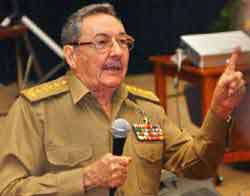
By a curious coincidence today’s Morning Star includes an article by US activist, Ron Ridenour, concerning the future of Cuba, entitled “beyond the Crossroads”. He quotes Raul Castro from his 1994 speech “Si, se puede” (Yes, one can), which signalled "the start of a campaign against passivity, routine and bureaucracy."
Ridenour points out that there have been tangible signs of success. “In contrast to a plethora of prostitutes and hustlers, these opportunists are now rare. I never frequent tourist spots where some prostitutes are said to hang out, but there are fewer and they are not walking the streets. Some young men still hustle stolen cigars, but they are fewer and they are more wary of being caught.”
But Ridenour also poses the very good question: “If the working class was really opposed to "passivity, routine and bureaucracy," why did it not initiate its own campaign against them?”
As Ridenour explains: “This is so, first and foremost, because the working class does not control the means of production or the country's internal and external politics - not directly. Union leadership has some input at top levels, but union leadership is appointed by the top. There are no demonstrations without the top authorising and organising them. Strikes are not permitted, although technically not illegal. Communist Party directors do not allow real grass-roots debate about policies in the media. Critique only occurs when leadership decides to take up a controversial theme.”
There was an interesting article about this question in Counterpunch recently by Saul Landau (who made the 1968 film "Fidel") that while supportive of the Cuban revolution makes the point: "Young Cubans, on and off the island demonstrate high levels of culture, except when political themes arise; their eyes glaze. "After I returned from Vietnam in March, a Cuban friend asked about that country. Prospering," I said."Imagine, the Americans bombed them into the Stone Age and they're prospering. Not a bomb has fallen on Havana and yet we live like we're in the Stone Age."This habitual whine should be taken with the proverbial grain of salt. Cuba's investment in human capital did initially stimulate political consciousness. Cubans defended their revolution against a relentless US dirty war, because they understood their cause and their enemies. An anti-imperial and a class struggle! Through the 1970s, Cubans remembered the murderous practices and invidious capitalism of the pre-revolutionary era. Today, 75 percent of the population doesn't remember Batista's cruelty or US neo-colonialism. Lacking vivid memory and without having political input, they have grown tired of Party jargon and slogans that bear little relationship to their reality."
As Castro has recently passed power provisionally to his brother Raul, the important question is raised. To defend the revolution how can its mass popular base be strengthened? Raul is of course not the only candidate for taking the job, other possible candidates include: Vice-President Carlos Lage, Parliament Speaker Ricardo Alarcón, and Foreign Minister Pérez Roque.
But whoever takes over will they have to combat the cynicism that so many Cubans feel, and trust popular participation in debate. There is a need for a campaign for socialist democracy to defend the revolution.
No comments:
Post a Comment